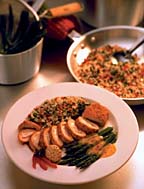
Accounting for $310 million in sales in 1996, the vegetarian market in the U.S. is projected to reach sales of $1.25 billion in 2001, growing 20-40%, annually, during that time. Fueling that success has been a public that is increasingly concerned about its health, as well as a greater awareness of the benefits of a meat-reduced diet. Also contributing to the surge has been a wider distribution of vegetarian products through traditional and non-traditional channels.
Meat consumption peaked in 1999, and has fallen only slightly since. Nonetheless, manufacturers of vegetarian foods should not fret, as major market growth is expected among “occasional vegetarians”—meat-eaters who sometimes substitute animal products with vegetable alternatives. In a 2000 survey, the Vegetarian Resource Group, Baltimore, found that 25% of Americans avoid meat at least occasionally.
The Substitute
The “meat and potatoes” meal tradition in America is a roadblock to a large-scale expansion of vegetarianism. Many meat-eaters (83% in Mintel's research) believe a life without meat seems Spartan and slightly unhealthy. With more research showing the benefits of moderating meat consumption, consumers are likely to move away from those meat-centric ideals.Mintel found the majority of red meat-eating respondents did not make use of vegetarian meat alternatives. Of red meat eaters who limit meat intake for health purposes, 46% use meat alternatives, particularly prepared vegetarian meals which may be used in place of a red meat meal.
Of respondents who do consume meat alternatives, the most common are substitutes for hot dogs and hamburgers, as most meatless versions have a look and taste very similar to their meat-based counterparts. Consumers often find meatless substitutes for breakfast items and vegetarian items, such as tofu, do not result in the same taste and texture as their meaty counterparts. In addition, the preparation of these products may be too time-consuming or unfamiliar for the typical respondent.

Mintel advises food companies to keep the occasional vegetarians interested by frequently introducing the novelty factor. Boca Burger, Madison, Wisc., and Morningstar Farms, Battle Creek, Mich., keep their product offerings “contemporary” with such items as “Mexican” versions of non-meat burgers. Other pressures on consumers should be heeded as well, so keep in mind a need for convenience and portability.
Leading the frozen, meatless burger/meat substitute category, Worthington Foods, Battle Creek, Mich., has a wide range of products, boosted by providing meat alternatives in more than one presentation—as patties and crumbles. Boca Burger may see its market share increase, as products introduced in 2001 take hold.

Milking Success
Beyond meat alternatives, soy milk has distinguished itself in the vegetarian category, with sales growing by more than 800% over the last two years in food, drug and mass merchandiser (FDM) channels. Such non-dairy milk alternatives meet a number of consumer demands—women who need the products for health reasons related to menopause, consumers who are lactose-intolerant, and those embracing a vegetarian or semi-vegetarian lifestyle.Soy milk sales in supermarkets may slow considerably, Mintel cautions, as the market becomes saturated with the product. Accelerated sales of soy milk have largely been a result of increased distribution rather than consumption. White Wave, Boulder, Col., for example, became the first national brand of soy milk in 1999, as regional brands also expanded beyond natural foods outlets and into supermarkets. Also boasting significant market share in this area are Westbrae, Compton, Calif., and Eden Foods, Clinton, Mich., each with about a third of the market. Another third features Imagine Foods, San Carlos, Calif., and other brands.
Soy milks, Mintel believes, hold promise for the future. More development is expected in this niche, aiming for milks with less of a soy taste. Look for additional advances in such areas as cheese, with increased cooking versatility. In the dairy-free area, Soyco Foods', Orlando, Fla., Veggy Chunk Mozzarella is touted as “nature's alternative to cheese.” Boasting no preservatives, lactose or fat, the product is made with soybeans.
The prepared meals segment holds additional promise, as some successful gourmet items with higher price points have made their way to market.
Consumer interest in healthful eating is expected to continue, which will provide further growth to the vegetarian food market, Mintel predicts. Concerns about the “integrity of the food supply” will “encourage consumers to look for foods produced with care—an image the vegetarian food products already have.” Vegetarian food sales are expected to grow 125% from 2001 to 2006, as non-vegetarians prompted by health concerns add these product to their diets. Soy milk will boast the greatest growth, and meat substitutes will continue to increase their sales, though more slowly.
For more information on the report, the “U.S. Vegetarian Foods Market,” contact Mintel International Group Ltd; 213 W. Institute Place, Suite 208; Chicago, IL 60610; phone: 312-932-0400.



